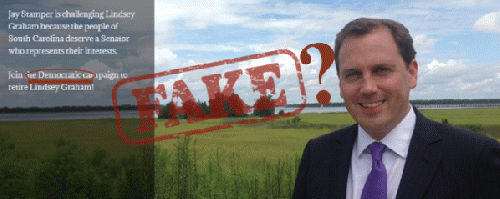On March 24 Karen Smith of Dorchester, S.C. filed to run in the Democratic primary against 6th District incumbent Rep. Jim Clyburn. That same day I was contacted by folks who asked about her, since Smith listed a residential address in my county, where I'm PR rep for the local Democratic Party.
I couldn't answer any questions, though. I never even heard of her before.
Glancing through public records, I learned that Smith voted in every Republican primary since 1996. Since I'm the one who gets press calls for the local party, I contacted her directly, and she told me upfront with no prodding that she's not a Democrat. In fact, Smith's "only in allegiance with God," she said. Her home address is just a half-block off a major traffic route in my community, so I made a quick turn one day to see a "Don't Tread On Me" sign on her door and "FairTax" stickers on her mailbox. Smith also told another reporter that she was Tea Party.
So why, let alone how, would she run for this office as a Democrat?
The reason is simple, unfortunately. Smith can do it in the same way Alvin Greene did in 2010. And Bob Conley in 2008. Don't forget Benjamin Hunt in 1990, and you can toss in Ben Frasier for almost every election year from 1972 through 2013, too.
And for 2014, it appears that Smith is joined by another (apparently) fake Democrat, Jay Stamper, who's seeking party nomination for the seat currently held by Sen. Lindsey Graham. But at least Smith is admitting it.
Welcome To South Carolina
If you're unfamiliar with this type of circumstance, welcome to South Carolina, a state so deep in political shenanigans and for so long that as far back as 1860 was it dubbed "too small for a republic and too large for an insane asylum."
In the Palmetto State, voters don't declare any political party affiliation when they register to vote. All of us are (technically, at least) independents. That means any voter of any political persuasion can vote in any party's primary.
Candidates can register with any party, too; all they have to do is sign a "party pledge," and political parties can't try to stop them (especially since last year, when laws passed that make candidates register only with a Board of Elections, and without even having to tell the political party they claim to represent).
And this scenario, of course, opens doors for dirty politics. Candidates who don't want the expense or risk of a primary against an incumbent can simply run on the other party's ticket. Voters from one party can swarm the opposing party's primary to get a weak candidate nominated, thus ensuring their favored candidate has an easy win, and opposing campaigns or parties can even put up such a fake candidate. Shoot, it's like the Atlanta Falcons picking the starting lineup of the Carolina Panthers the next time the two teams play against each other. It just ain't right.
Stamper's Stunts
While Smith is at least honest about it, Stamper isn't. He's marching under a very liberal banner, and attacking others who don't share his opinions, even other Democrats in other races.
To me, that indicates he's a Republican plant. He could never beat incumbent Graham, and a primary loss for Stamper could leave some liberal voters feeling alienated to a point they won't bother to vote in the general election, leaving other Democratic candidates at risk of low turnout for November.
He has a very, very questionable background, too -- both politically and personally -- and that's been reported by national media for over a decade.
(Note: You can view every article as one long page if you sign up as an Advocate Member, or higher).





